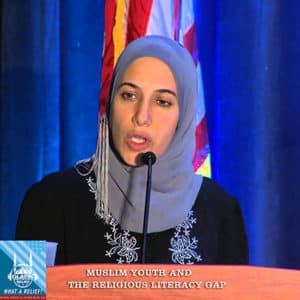 B.C. Dodge & R. Mordant Mahon talk to Hadia Mubarak in this episode of “What a Relief!” — IRUSA’s official podcast.
B.C. Dodge & R. Mordant Mahon talk to Hadia Mubarak in this episode of “What a Relief!” — IRUSA’s official podcast.
This week B.C. & Mordant welcome Hadia Mubarak. Hadia is a lecturer on religion and gender at the University of North Carolina at Charlotte and works with the Institute for Social Policy and Understanding (ISPU).
She joins the podcast this week to talk about her work on an article for ISPU about the religious literacy gap currently impacting Muslim youth.
She explains the term religious literacy as, “having a clear understanding of a religion beyond just rituals and practices, beyond what is taught in a Sunday school class.” The concern surrounding this gap stems from a larger concern about helping Muslims have a strong sense of identity. For Muslim youth, this gap could lead to misunderstandings, confusion, and even extremism.
“The idea was that the findings would be useful to Muslim communities, to educational centers and anyone really who is interested in the field of religious literacy and promoting religious literacy,” she says.
With the current sociopolitical climate, the need for such a study is becoming increasingly clear. “Muslim youth today are increasingly put in a situation where they are asked to answer questions about their religion that they may have no clue how to answer,” Hadia explains. “And we’re finding that this starts as young as elementary school.”
More and more, it is becoming clear that young Muslims want to be able to represent their faith, but simply don’t know how. Beyond understanding the basic tenants of the faith, it is important that young Muslims have access to studying the diversity within Islamic law and its different manifestations in different cultures.
And it is about more than just what is being taught, it is about how.
“Not just focusing on content, but on the way that Islam is taught,” Hadia says, is important. “There is a need to create safe spaces for youth where they can ask questions.”
Tune in to this week’s episode to hear more about this interesting study, and hear Hadia share her personal success stories as a professor, as a researcher, and as a Muslim woman striving to make a positive impact.
“We live in a day and time where ignorance can feign itself as expertise.” she says. “We should value truth, we should value honesty, we should value facts, and that’s really my message